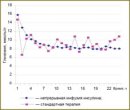
The Optimization of Glycemic Control in Patients with Type 2 Diabetes Mellitus in Peracute Stroke
The aim of the investigation is to determine an optimal method of glycemic control in patients with cerebrovascular accident and type 2 diabetes mellitus.
Materials and methods. 43 patients with insulin and type 2 diabetes mellitus were included into the study. The patients were divided into two groups: the patients of the first group (n=23) had continuous insulin infusion within not less than 24 h, the patients of the second one (n=20) — subcutaneous insulin injections.
Results. The patients of both groups had statistically significant difference of glycemic indexes in 24 h, and furthermore, the control group had high variability of glycemic indexes. Continuous insulin infusion compared to discrete subcutaneous injections provides gradual glycemia decline up to target values and more stable retention of glycemia within the given range that increases intensive insulin therapy safety. It allows to consider the method of intravenous insulin administration to be optimal for glycemic control in patients with type 2 diabetes mellitus in peracute stroke.
- Wolfe C.D.A., Giroud M., Kolomisnky-Rabas P. et al. Variations in stroke incidence and survival in 3 areas of Europe. Stroke 2000; 31: 2074–2079.
- Brainin M., Olsen T.S., Chamorro A. et al. Organization of stroke care: education, referral, emergency management and imaging, stroke units and rehabilitation. Cerebrovascular Diseases 2004; 17(suppl 2): 1–14.
- Leys D., Kwiecinski H., Bogousslavsky J. et al. Prevention for the EUSI executive committee and the EUSI writing committee. Cerebrovascular Diseases 2004; 17(suppl 2): 15–29.
- Howard B.V., Rodrigues B.L., Bennett P.H. et al. Diabetes and cardiovascular disease: writing group I: epidemiology. Circulation 2002; 105: e132–e137.
- Ho J.E., Paultre F., Mosca L. Is diabetes mellitus a cardiovascular disease risk equivalent for fatal stroke in women? Stroke 2003; 34: 2812–2816.
- Haffner S.M., Lehto S., Ronnemaa T. et al. Mortality from coronary heart disease in subjects with type 2 diabetes and in nondiabeticsubjects with and without prior myocardial infarction. N Engl J Med 1998; 339: 229–234.
- Barrett-Connor E., Khaw K.T. Diabetes mellitus: an independent risk factor for stroke? Am J Epidemiol 1988; 128: 116–123.
- Tuomilehto J., Rastenyte D., Jousilahti Р., Sarti C., Vartiainen E. Diabetes mellitus as a risk factor for death from stroke: prospective study of the middle-aged Finnish population. Stroke 1996; 27: 210–215.
- O’Brien R.E., Hildreth A.J., O’Connell J.E., Gray C.S. Presentation and outcome from stroke in patients with diabetes mellitus: the influence of pre-stroke care. Cerebrovasc Dis 2005; 19(suppl 2): 66.
- Burchfiel C.M., Curb J.D., Rodriguez B.L. et al. Glucose intolerance and 22-year stroke incidence: the Honolulu Heart Program. Stroke 1994; 25: 951–957.
- Kannel W.B., McGee D.L. Diabetes and cardiovascular disease: the Framingham Study. JAMA 1979; 241: 2035–2038.
- Weir C.J., Murray G.D., Dyker A.G., Lees K.R. Is hyperglycemia an independent predictor of poor outcome after acute stroke? Results of a long-term follow up study. BMJ 1997; 314: 1303–1306
- Scott J.F., Robinson G.M., French J.M. et al. Blood pressure response to glucose potassium insulin therapy in patients with acute stroke with mild to moderate hyperglycemia. J Neurol Neurosurg Psychiatry 2001; 70: 401–404.










